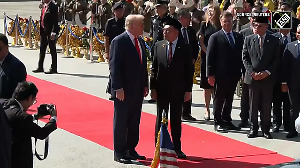Rejecting that India's defence cooperation with the US and Japan was aimed at containing China, Defence Minister Pranab Mukherjee has said that there was "enough space" for the two neighbours to develop.
"No. We do not believe in the policy of containment or balance of power because I think that there is enough space in which both China and India can develop. The efforts of India are not competitive but complementary with each other," he said in an interview to China's state-run CCTV 4 telecast Tuesday night.
He was asked if India's recent military agreements with the US and Japan were intended for the balancing of China.
Complete coverage: The Indo-US nuclear tango
Asked whether he was satisfied with the level of defence cooperation with China right now, he said: "The joint exercise which we had earlier was quite successful. We would like to expand it in more areas, the details are to be worked out in consultation with each other on mutually agreed dates."
Replying to a question when one would see the joint exercises on the ground level, he said the details would be worked out. "We do not have the framework. We have in place the institution and through consultations the dates of the programme would be worked out. We have also suggested that our cooperation should be an annual event," he said.
When pressed to comment on the so-called 'China threat,' Mukherjee said: "I am afraid we do not believe in that type of phraseology."
"In fact during my talk with the Chinese defence minister and foreign minister, I made it quite clear that we trust each other and we do not pose a mutual threat to each other, that is why all these arrangements have been made. If you consider that there is a threat, then there was no need of exchanging views, putting in place such arrangements and signing an MoU (with China on defence cooperation)," Mukherjee said.
When asked if he agrees with the view that India is one among the largest weapon importing countries, Mukherjee said: "I am afraid I cannot."
"Our import requirement is quite modest. Compared to its size, compared to its requirement for modernisation and compared to its vast area, which is to be protected. So it is not very high in that sense," he said.
"The modernisation programme of the Indian Armed Forces is a continuing one. After all the world is not stagnant. There has been a sea change in military matters, which is now called Revolution of Military Affairs (RMA). There has been a sea change in operations, in tactics, in strategy," he said.
"Therefore, to keep pace with the changing situation, the government is pursuing a continuing programme of modernisation," he said.
Commenting on the historic defence cooperation MoU he signed with his Chinese counterpart on Monday, Mukherjee said it provides the framework for military-to-military cooperation, joint exercise and also exchange of visits both at the defence ministerial-level and at the military level.
"I had suggested a 7-point programme to the Chinese defence minister, to which he has agreed. The MoU would also facilitate the institutionalisation of cooperation between the two ministries and also the two armed forces," he said.
When questioned again on the 'China threat' issue, Mukherjee said: "I do not consider China a threat to India, nor China should consider India as a threat. We are not threatening anybody."
"We do not believe in competition. We do believe that there in enough space for the legitimate growth of India and China. We can act as complementary to each other and we need not be competitive. I have also highlighted this aspect in my talks with the Chinese leadership," he said.
About the 1962 India-China war, the defence minister said: "Let us not look back, let us now look forward. Let us not resurrect the past. Forty five years have passed since 1962, exactly forty four years.
"We have a forward looking approach. Both countries have engaged in improving their relationship all round. During the visit of Chinese prime minister to India, both prime ministers agreed to build a strategic cooperative partnership between India and China."
"Therefore let us not resurrect the past, let us look forward. I do believe that if India and China come closer, then there is enough space for respective development," he added.
Asked for his comment on the Chinese army, the defence minister said: "It is a brilliant army. It is one of the largest in the world. It has its own contribution in development. It is professional. Now it is going for modernisation and helping the government in nation building."
When asked to comment on the Indian Army, Mukherjee said: "We are proud of the Indian Army. It is professional, secular and it represents India's collective strength along with its tradition and we are proud of our armed forces."
Denying that there was pressure on him to postpone his maiden trip to China in March, the defence minister stressed: "No, not at all."
He also stoutly denied that the postponement of the trip was due to the visit of US President George W Bush to India in early March. "Absolutely nothing," he said.
"The reasons are very simple. Our Parliament session was extended. I am the Leader of the House of Representatives. That is why, when Parliament is in session, it is difficult for me to leave Parliament. That is one reason.
"The second reason was that the dates for some provincial assembly elections were declared and as a functionary of my party it was necessary for me to be present during these elections. These are the two reasons. It has nothing to do with anybody coming or going. And it is not at all complicated," he said.




